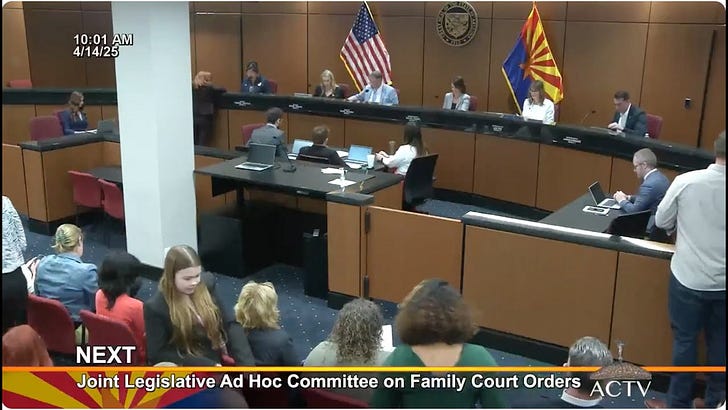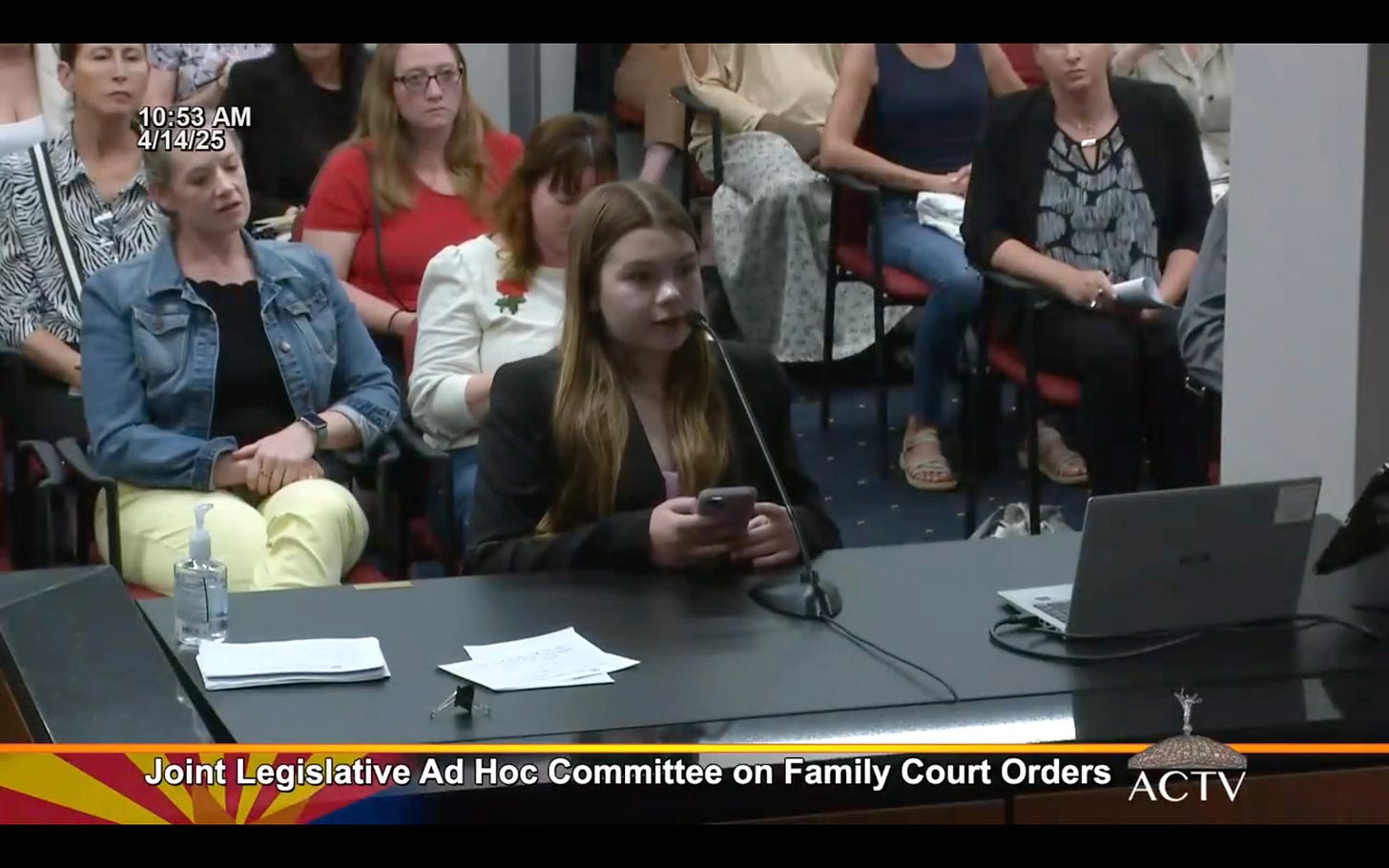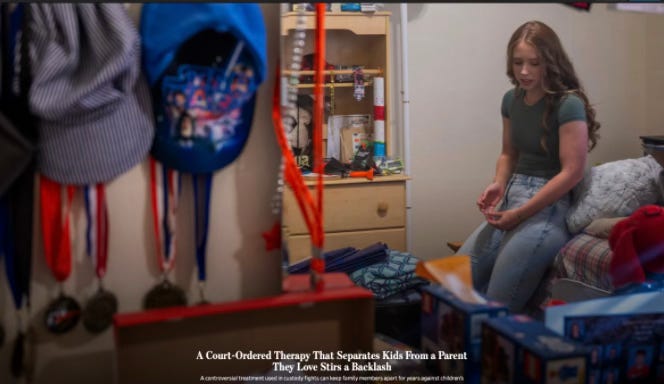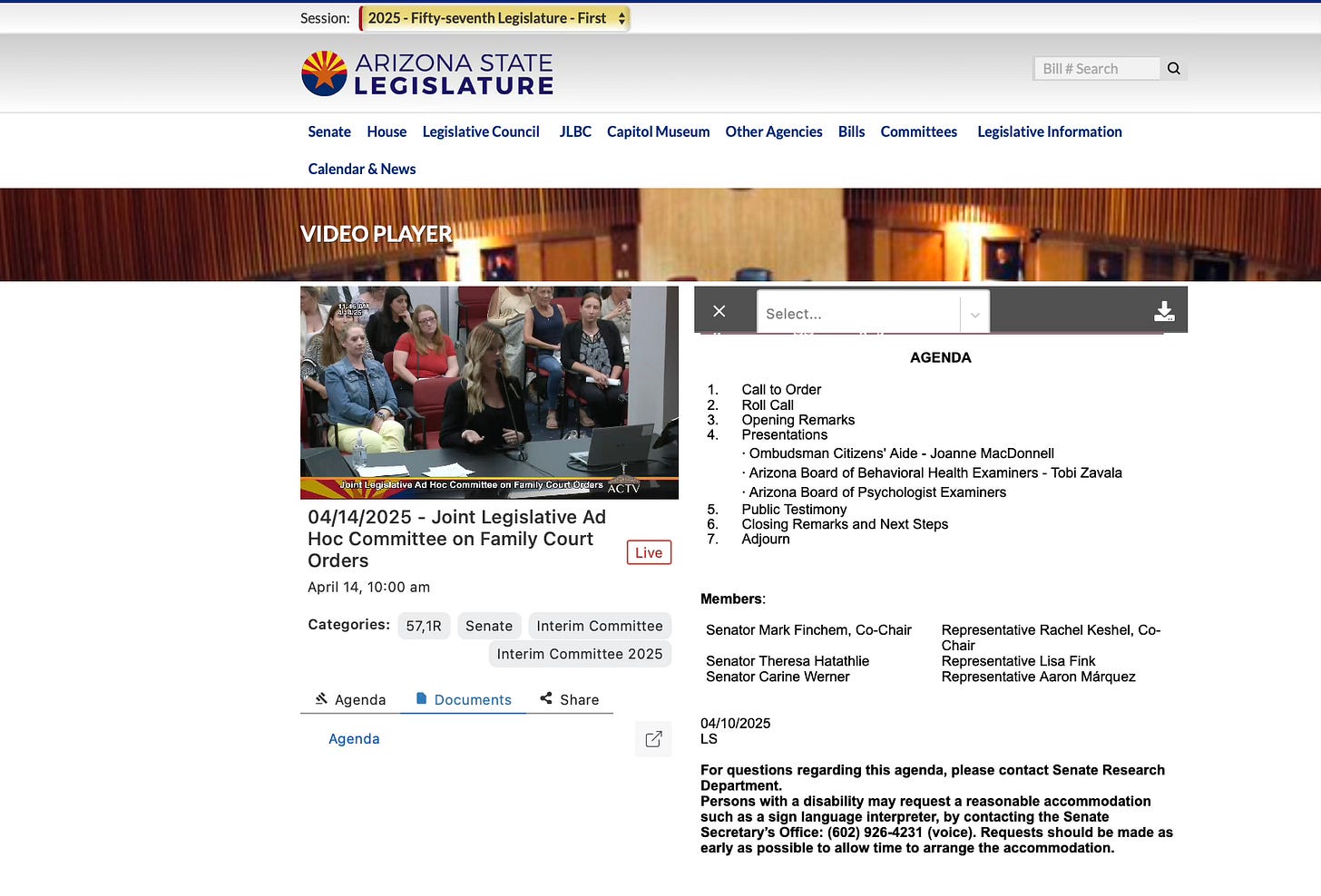Arizona’s Family Court Crisis: Lawmakers Hear Harrowing Testimony from Children, Parents, and Survivors
ARIZONA JOINT LEGISLATIVE AD HOC COMMITTEE ON FAMILY COURT ORDERS
By Julie M. Anderson-Holburn
In a landmark livestreamed hearing on April 14, 2025, at the Arizona State Capitol, the Joint Legislative Ad Hoc Committee on Family Court Orders launched what may become one of the nation’s most significant state-level inquiries into family court failures. I attended the hearing via livestream and documented testimony in real time. What emerged was a raw and unfiltered glimpse into a system accused of devastating families under the guise of justice.
This heart-wrenching forum is a must-watch: AZ Ad Hoc Committee on Family Court Orders:
More than 30 speakers—including children, parents, mental health professionals, and advocates—shared personal stories about a legal system that, they say, routinely ignores abuse, strips protective parents of custody, and funnels families into a for-profit network of court-appointed therapists, custody evaluators, and so-called "reunification camps," often accompanied by no-contact orders. Several speakers claimed judges issued these orders without trials, hearings, or legal justification.
Sophia Clever: A Child’s Voice That Couldn’t Be Ignored
Among the most powerful testimonies came from 15-year-old Sophia Clever, a high school honors student whose story I previously chronicled in a two-part investigative series.
“My name is Sophia, and I'm 15 years old. I'm a high school honors student. Me, my 10-year-old sister, and my mom have been victims of family court for over five years. With no end in sight.”
Sophia testified that a Court-Ordered Behavioral Interventionist (COBI) met with her only twice in 18 months, while a therapist acting outside the scope of a Therapeutic Interventionist (TI), a parenting coordinator who never met the children, and a court-appointed custody evaluator were all added to her case. The court then ordered a forced second mortgage on her mother’s home to finance their fees.
Despite complying with court orders, Sophia and her sister were labeled “enmeshed” with their mother and deemed “alienated”—a common tactic used to justify custody switches. Her mother was left with just two to four hours of supervised visitation per week.
“We lived in fear. We were depressed. We missed doctor’s appointments, dance classes, and even meals — food was taken away as punishment.” “My mother spent over $550,000 and lost all her life savings and investments. The judge even ordered her to sign a HELOC to pay for the custody evaluator. Can family court force a parent to take out a second mortgage?” “The court always talks about the best interest of the child — but how is this in my best interest?”
Lawmakers responded with applause:
“Sophia, thank you for your courage.”
“You’re a courageous young lady.”
“We’re proud of you. Keep fighting.”
My previous coverage of Clever’s case:
Robert Del Garbino: "They Accused Me of Alienation Without Proof — Then Alienated Me"
At the 37:13 mark, Robert Del Garbino shared his three-year battle to maintain contact with his son. After spending over $80,000 on court-appointed psychologists and TIs, he was cut off from his son for 11 months. A qualified provider later resolved the case for $2,400—in just three weeks.
“You provide an AFI—an affidavit of financial information. That tells everyone how much money you make, and how much can be harvested by bad actors in the system.”
He described a system where therapists and evaluators leverage no-contact orders against protective parents, creating financial pressure and driving prolonged legal entanglements.
“This paradigm pits an abusive parent against a protective parent. The psychologist shifts the no-contact order onto the protective parent, forcing the child to live with the abuser. Of course, the protective parent will pay whatever it takes to save their child.”
“A 90-day no-contact order kept me from seeing my son for almost a year. My son is 17. He begged the court to speak to him. The judge refused.”
When Sen. Mark Finchem asked what justification the court gave for the no-contact order, Del Garbino replied:
“There was no justification whatsoever—except that my ex-wife's attorney stood up in court and said, ‘He alienated the child’. No proof. None whatsoever.”
Finchem responded:
“So let me get this straight: they accused you of alienation — and the solution was to alienate you?”
“Correct,” Del Garbino said.
Rep. Lisa Fink asked:
“So the judge said parent alienation was the reason. Do you know what statute she utilized?”
“None. It was the simple verbiage the lawyer stood up in court and said, ‘he alienated his child from his mother’ — no evidence and no proof.”
Angie Nielsen: "It’s Like Ransom"
At 58:45, Angie Nielsen testified she has spent over $1 million in legal fees across 14 years. Her son was sent to Building Family Bridges, a controversial and now-banned reunification camp.
She still pays $2,000 per month for four hours of visitation a week to see her son.
“If I don’t pay, I don’t get to see him. It’s like a ransom.”
“My children say they want to be with me. It’s ignored. The court called me an alienator.”
Her daughter, Victoria Nielsen, an honors student at Oregon State University, previously testified before the legislature and was featured on the front page of The Wall Street Journal:
A Court-Ordered Therapy That Separates Kids From a Parent They Love Stirs a Backlash
“I’m being financially crucified. This is pay-to-play until we’re all broke.”
Finchem challenged the term “reunification”:
“So you separate a child from a parent — and then call it reunification?”
“Exactly,” Nielsen replied.
Dominic: "This Is No Different Than Child Trafficking"
At 1:13:00, Dominic testified that he paid more than $2,000 per hour in legal, testing, and supervision fees just to see his son for eight hours per month.
“This isn’t justice. This is extortion. This is no different than child trafficking. People are making extreme amounts of money off of this — and the only difference is we have it under the guise of being legal.”
Dr. Michelle Fox: "It’s Happening — And It’s Horrendous"
At 1:19:00, Dr. Michelle Fox testified about her eight-year legal battle, during which she spent over $300,000 trying to protect her son.
“The damage is irreparable.”
Fox reported signs of sexual abuse, later confirmed by law enforcement during two forensic interviews. Still, she lost custody.
“The court-appointed Best Interests Attorney threw papers in my face in court. The judge did nothing.”
After a judge rotation, the new judge ruled the TI appointment unconstitutional.
“What is happening is so horrendous that most people dismiss it outright. But it’s happening. Please — keep listening. Our children desperately need your help.”
Kristin Alcott Defends the System — And Faces First Amendment Pushback
At 1:25:00, Kristin Alcott, a Therapeutic Interventionist and Parenting Time Supervisor with Family First Forensic Consultants, defended the use of TIs and reunification therapy.
“Parental alienation falls under child abuse, which is a DSM diagnosis… Psychological abuse, emotional abuse — those are all defined within the DSM,” she told lawmakers.
Alcott, a former assistant to controversial custody evaluator Ronn Lavit, is reported to be apprenticing under Dr. Weinstock JD, PhD, and Dr. Branton, PsD of Intensive Family Transformations while working toward her master’s.
Finchem pressed her on judicial authority:
“Are you telling me judges get to decide from the bench what they feel like that day? Are they allowed to just break the state law?”
“In essence, a judge can order whatever they would like,” Alcott said.
Finchem shot back:
“Courts are bound by law — not their whims.”
When asked for data on the effectiveness of reunification therapy, Alcott replied:
“We were just speaking today about piloting a study.”
Closing Remarks: "Judges Do What They Want"
Rep. Mark Finchem closed the hearing with a warning and a promise:
“Based on what we’ve heard so far, it’s clear that the civil rights of both children and parents have been violated — not just by the court, but by quasi-officers of the court.”
“We need far more time than the two hours allotted today. The next session will likely run six hours. I sincerely apologize.”
“We’ll hold four more hearings. We are collecting data through a JotForm. Email me at mfinchem@azleg.govor visit azleg.gov to request the link.”
Rep. Rachel Keshel, Co-Chair, followed:
“It’s hard not to get emotional. A family first came to me last August, and I’ve met dozens of you since.” “One of the most profound things said today was: ‘Judges do what they want.’ That’s a problem.” “There’s supposed to be a system of checks and balances — and that’s what your legislature is here to provide.”
Finchem concluded:
“What I’ve heard so far tells me there’s a big problem here. You don’t take big problems and solve them with simple answers — that’s a recipe for disaster. But if we can get ourselves to a place in statute where we return to what is permitted and what is prohibited, that’s a step in the right direction.”
“We need your engagement if we’re going to improve the system. It’s not going to happen overnight — but it will most assuredly happen.”
With that, the committee adjourned.
What Comes Next
This was the first of five scheduled hearings. The second hearing is set to run six hours. Proposed legislation, including HB 2256, would regulate court appointees, enforce credentialing standards, cap financial burdens on families, and mandate judicial accountability.
Meanwhile, what are California legislators and authorities doing about this same crisis?
Related coverage from California and Arizona:
EXCLUSIVE: The Paralegal Pretenders of Orange County — A Hidden Threat in Family Court
Orange County’s Justice Meltdown: Judge Carmen Luege’s Unlawful Orders and Due Process Violations
OCDA Ignores Good Cause Law, Family Court Violates Due Process in Tawny Minna Grossman Case
Judicial Misconduct in OC? Judge’s Threats Against Mother Over Media Coverage Become Reality
Weaponized Gag Orders: How an OC Judge Is Silencing a Quadriplegic Mother’s Fight for Justice
Orange County Judges Block Public and Media from Court Hearings
Update: “Tar’s Road to Recovery” Mom Bullied by OC Minors’ Counsel in Fight Over Special Needs Trust
OC Judge’s Orders Lead to Premature Birth: Baby Sahara Fights for Life
California Judges: The Good, the Bad, and the… San Joaquin County, Part Two
Welcome to Unveiled and Uncensored: Investigating Family Court Corruption







Reply to “Arizona’s Family Court Crisis” – A System That Should Make Us All Sick
Julie,
Thank you for your powerful and devastating coverage of Arizona’s family court crisis. As someone who has spent years in the trenches of family court — not as a licensed attorney but as a mother forced to become her own advocate — I read this article with a painful mix of solidarity, sorrow, and outright disgust.
What happened to Sophia Clever and the many other families who bravely testified isn’t just horrifying — it’s criminal. The weaponization of "parental alienation," the economic exploitation of desperate parents, and the outright dismissal of abuse evidence are not judicial errors. They are systemic abuses that hide behind court decorum and legal jargon while permanently destroying families.
The term “ransom” is right — because that’s what it is. Forcing families to choose between feeding their children or funding court-appointed evaluators with unchecked power is not just unethical; it's inhumane. That a judge can order a second mortgage on a protective parent’s home — to pay the fees of the very people harming her children — is something I still can’t read without my blood boiling.
And what’s worse is how familiar this all sounds. These are not isolated stories. Connecticut. California. Oregon. Now Arizona. The states may change, but the pattern is the same: court insiders get rich while protective parents are silenced, criminalized, and bankrupted — all under the guise of “the child’s best interests.”
Sophia’s testimony pierced through the institutional fog with the kind of clarity only truth can carry. That a 15-year-old had to be the voice of reason in a courtroom of professionals should shake this country to its core. And it should be a wake-up call for every legislator, journalist, and citizen who still wants to believe the family court system is working.
It’s not.
The courage of these parents and children must be matched with action. Reform is no longer enough. We need a full-blown reckoning — with oversight, consequences, and the kind of sweeping legislative change that finally puts an end to this taxpayer-funded abuse.
Thank you for giving these families a platform. Please don’t stop. The court may try to silence us — but with voices like yours amplifying ours, they won’t succeed.
In solidarity and shared outrage, Margaret
Thank you for sharing this!